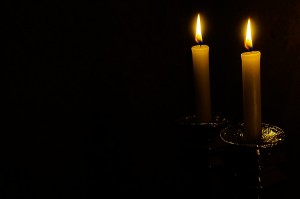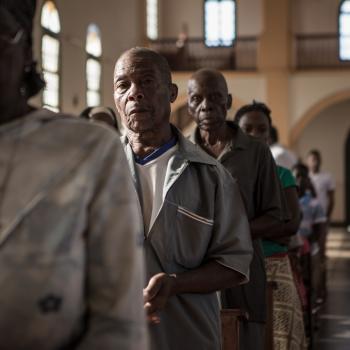“Hope lost and fear won,” said Udi Segal, the diplomatic correspondent for Israel’s Channel 2 News. Referring to Secretary of State John Kerry’s nine-month negotiations whose collapse in April contributed to the escalation, Mr. Segal added, “I don’t think the people in Palestine or in Israel feel more confidence in those Western, American Kerry-like ambitions to solve our problem with those peace slogans.”
This week, again, the news fills me with despair. But on Shabbat I recover hope. Is this a two-state solution to the problem of being human: six days, despair; on the Sabbath, hope?
This summer I flew in turbulent weather. I gripped the armrest, squeezed my eyes shut, and visualized: land, land, let me stand, once more, on solid ground for peace.
At night, when I’d prefer to be sleeping, my perseverating mind goes to war with my worn body. I need a two-state solution: one that will allow me to sleep when I sleep, one that will allow me to work when I work.
I am not a gardener. I am not a weeder. I am not a pruner. I am not a fertilizer. I am not a tender of soil. I do not turn to land for peace.
My problems are real. My problems are white and American and Jewish and middle class and academic and male. My problems are nothing compared to the problems of others. Reading and watching and thinking about theirs, the problems of those who are walking targets, those who are working poor: could this be the one- state solution to my problems?
Would a two-state solution look like this: devoting my waking hours to creating conditions in which all can thrive? Say the fathers of the Talmud, “You are not obligated to complete the work, but neither are you free to desist from it.”
I drive around my part of the state. In Yancey County, land for sale. In Madison County, land for sale. In Mitchell County, land for sale. Will the land sell for luxury, a gated community, a golf resort? Or will the land sell for peace, an off-the-grid potter’s studio, a meditator’s retreat?
Can anyone state, in simple terms, a solution to the problem of global warming? Can anyone state, in simple terms, a solution to the problem of sexual harassment and rape? Can anyone state, in simple terms, a solution to the problem of the surveillance state? Can anyone state, in simple terms, a solution to the problem of institutional racism? Can anyone state, in simple terms, a solution to the problem of homelessness? Can anyone state, in simple terms, a solution to the problem of growing numbers of refugees around the world?
Can anyone state—Oh! The problems seem to multiply, when you try to tally them, the problems seem too many to count!
This past Shabbat, I joined the congregation in saying aloud, after the Torah service (usually I let my mind, untethered, drift during this part of the service) a prayer for our country. May this land under Your Providence be an influence for good throughout the world, uniting all people in peace and freedom and helping them to fulfill the vision of Your prophet: “Nation shall not lift up sword against nation, neither shall they experience war any more.”
Then, still standing, we read aloud, May we see the day when war and bloodshed cease. And I thought, the prophets knew, and I thought, the rabbis who composed the symphony of Sabbath prayers knew, and I thought it goes back, it goes back, how far back it goes, the knowing, the knowing, the knowing of war. Will the land on which we build and sleep ever be for peace?
Who came up with the first two-state solution? God, when he counseled Abraham to honor Sarah’s wishes and send Hagar and Ishmael, his son, away. Abraham’s lineage, God says, will continue through Isaac. Ishmael, God reassures Abraham, will also be the father of a nation. Thus, God’s two-state solution. I’ll leave it up to you to decide how that worked out.
Who has time for Palestine, time for Israel? In my community, a few small, devoted, loosely formed groups do; a few passionate individuals make their case in private and public, with raised voices and money. Emboldened by their synagogue, their church, they fight to make that land over there a land for peace for one side if not the other.
Beyond a two-state solution, beyond land for peace: Shabbat. And beyond Shabbat, even beyond beyond—the never and nowhere to which Sabbath prayers point? I could almost feel it, during the Shabbat service, but what I felt is beyond words.
Then I came back to this time, this place, this actual earth where slogans are lobbed like bombs, leaving behind smoking ruins: two-state solution, land for peace.
Richard Chess is the author of three books of poetry,Tekiah, Chair in the Desert, and Third Temple. Poems of his have appeared in Telling and Remembering: A Century of American Jewish Poetry, Bearing the Mystery: Twenty Years of IMAGE, and Best Spiritual Writing 2005. He is the Roy Carroll Professor of Honors Arts and Sciences at the University of North Carolina at Asheville. He is also the director of UNC Asheville’s Center for Jewish Studies.












